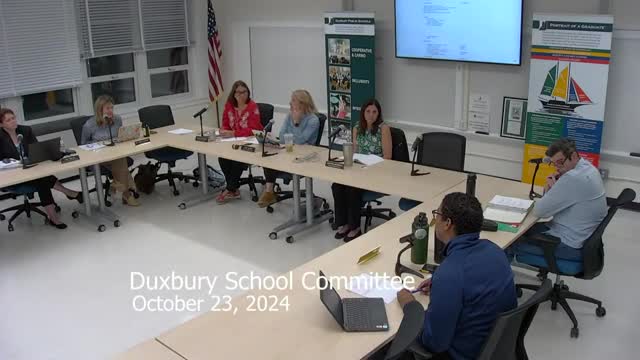Students Demand Change in Controversial Cell Phone Policy
October 23, 2024 | Duxbury Public Schools, School Boards, Massachusetts
This article was created by AI summarizing key points discussed. AI makes mistakes, so for full details and context, please refer to the video of the full meeting. Please report any errors so we can fix them. Report an error »

In a recent school committee meeting, discussions centered around the controversial cell phone policy currently in place at local schools. A survey conducted by a student revealed that out of 178 responses, 135 students disagreed with the policy, citing a lack of communication with guardians during emergencies and distractions caused by the phone caddy. Conversely, some students acknowledged improvements in productivity and class engagement due to the policy.
Committee members noted that many students expressed a desire for phones to be allowed during After School Programs (ASP), as they do not consider these sessions to be formal classes. The conversation highlighted a growing trend across the United States, where over half of the states have implemented restrictions on cell phone use in K-12 schools. Massachusetts, typically seen as progressive, has yet to adopt similar measures, leading some committee members to speculate that state mandates may soon follow.
The committee also discussed the need to revisit the wording of the current policy, particularly a section that has caused confusion regarding when cell phone use is permitted. Members agreed to consider rewording the policy to clarify its intent while acknowledging the challenges of implementation.
Additionally, the meeting touched on the integration of artificial intelligence (AI) language into the academic integrity sections of the school handbook. Committee members expressed interest in further recommendations on this topic, as they continue to monitor developments in AI and its implications for academic standards.
Overall, the meeting underscored the committee's commitment to addressing student concerns while navigating the complexities of technology use in educational settings.
Committee members noted that many students expressed a desire for phones to be allowed during After School Programs (ASP), as they do not consider these sessions to be formal classes. The conversation highlighted a growing trend across the United States, where over half of the states have implemented restrictions on cell phone use in K-12 schools. Massachusetts, typically seen as progressive, has yet to adopt similar measures, leading some committee members to speculate that state mandates may soon follow.
The committee also discussed the need to revisit the wording of the current policy, particularly a section that has caused confusion regarding when cell phone use is permitted. Members agreed to consider rewording the policy to clarify its intent while acknowledging the challenges of implementation.
Additionally, the meeting touched on the integration of artificial intelligence (AI) language into the academic integrity sections of the school handbook. Committee members expressed interest in further recommendations on this topic, as they continue to monitor developments in AI and its implications for academic standards.
Overall, the meeting underscored the committee's commitment to addressing student concerns while navigating the complexities of technology use in educational settings.
View full meeting
This article is based on a recent meeting—watch the full video and explore the complete transcript for deeper insights into the discussion.
View full meeting
